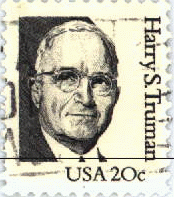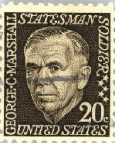Post-War Reconstruction
In several areas of the world the United States opposed
colonialism and demonstrated support for self-determination. A year
after the end of World War II,
President Truman  proclaimed
the full independence of the Philippines. The following year
Congress authorized the Puerto Ricans to elect their own
governor as a step toward becoming a self-governing commonwealth
in 1952, associated with the United States on the basis of
common citizenship.
proclaimed
the full independence of the Philippines. The following year
Congress authorized the Puerto Ricans to elect their own
governor as a step toward becoming a self-governing commonwealth
in 1952, associated with the United States on the basis of
common citizenship.
American leaders encouraged Great Britain in its decision to grant independence to India, Pakistan, and Burma, and served as mediators to expedite the independence of Indonesia from Dutch rule. In 1949 President Truman advanced his "Point Four" program to speed U.S. technical and financial assistance to the newly developing areas of the world. Under this program, American specialists in agriculture, education, public health, housing, and many other fields provided help and advice to countries throughout Asia, Africa, and Latin America.
As numerous new nations emerged on those continents, the
war-ravaged countries of Europe suffered severe economic
difficulties. In a speech at Harvard University early in June 1947,
Secretary of State
George C. Marshall suggested a sweeping
program to restore the economies of Europe. The Marshall Plan
offered American money, supplies, and machinery to any
European nation that wished to participate. Although they were
included in the offer, the U.S.S.R. and the east European nations
in the Soviet orbit declined to take part.

Launched in April 1948, this massive program of American aid, involving $ 12,000 million in goods and services, helped bring rapid economic recovery to 16 countries from Iceland to Turkey. In less than three years industrial production rose to 25 percent above prewar levels and agricultural output to 14 percent above prewar farm production.
Even as the Marshall Plan was getting under way, a critical situation developed in Berlin. In February 1948, France, Britain, and the United States consolidated their occupation zones of Germany and of Berlin (175 kilometers inside the Soviet zone of Germany). When the allies announced a currency reform to integrate the economies of their three zones and to bring the combined economy into close relationship with western Europe, the Soviet Union retaliated by first restricting and then totally blocking road and rail traffic between Berlin and West Germany.
The British-American answer to this Soviet action was the Berlin airlift. Starting in the summer of 1948 and continuing for nearly a year, British and American planes transported more than two million tons of food, fuel, medicines, and other necessities to the people of West Berlin. The Soviets lifted the blockade in May 1949.
The Berlin crisis, following the expansion of Soviet influence in east Europe and the threats against Greece and Turkey, aroused growing alarm throughout western Europe. As a consequence, in April 1949, 12 nations established the North Atlantic Treaty Organization (NATO) to coordinate the military defenses of member nations against possible Soviet aggression. Belgium, Canada, Denmark, France, Great Britain, Iceland, Italy, Luxembourg, the Netherlands, Norway, Portugal, and the United States --with Greece, Turkey, and the Federal Republic of Germany joining afterward--agreed to consider an armed attack against any one of them as an attack against all. In December 1950, General Dwight D. Eisenhower was appointed Supreme Commander of NATO military forces.
United States involvement in international affairs during the Truman Administration was not confined to Europe. In 1948 the United States joined 21 Latin American nations to form the Organization of American States (OAS), designed to insure peaceful settlement of inter-American disputes, to promote economic and social development in Latin America, and to provide for common defense.
In the Middle East, when the creation of the independent nation of Israel in May 1948 plunged that new country into war with its Arab neighbors, the United States supported the successful efforts of a U.N. truce team to arrange an armistice. For his work as head of this team, Dr. Ralph Bunche, the grandson of an American slave, received the Nobel Peace Prize in 1950.
